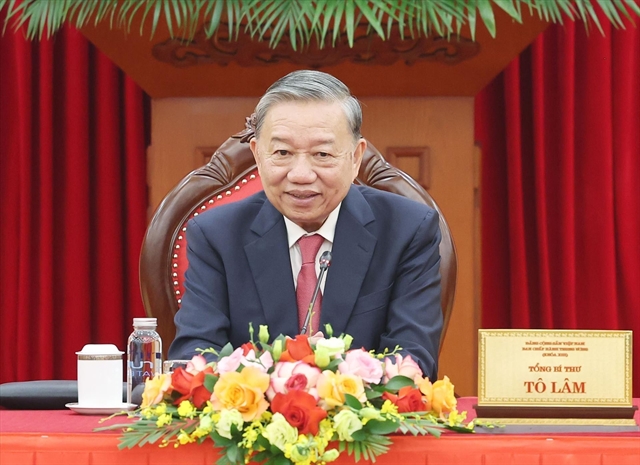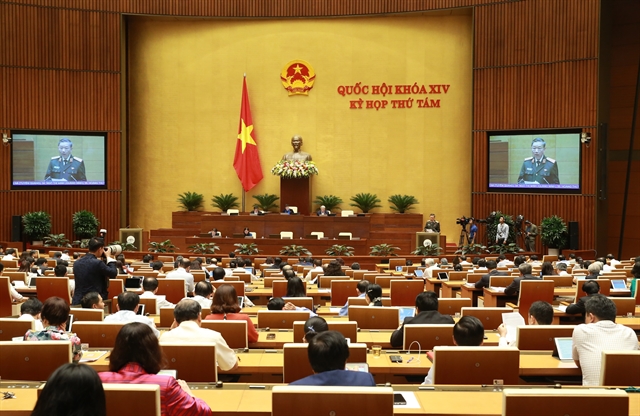 Politics & Law
Politics & Law


|
| Minister of Public Security Tô Lâm presens to the NA a report on crime prevention and law violations in 2019. VNA/VNS Photo |
HÀ NỘI Deputies at the National Assembly (NA) are growing increasingly concerned more and more young people are developing drug habits.
And they fear Việt Nam is becoming a transit route for the narcotics smugglers.
Minister of Public Security Tô Lâm on Monday presented to the NA a report on crime prevention and law violations in 2019.
According to the minister, this year police have smashed a number of drug production and trafficking rings, confiscating more than six tonnes of methamphetamine.
Many drugs gangs are setting up legal businesses to hide their illegal trade, taking advantage of favourable Vietnamese customs procedures to transport drugs from the Golden Triangle - an area where the borders of Thailand, Laos and Myanmar meet – into Việt Nam before being shipped elsewhere.
Deputy Triệu Thanh Dung from northern Cao Bằng Province said drug addicts are getting younger.
Among 47 criminals arrested in ten serious drug cases being investigated by the Investigation Police Department of Drug-related Crimes, 20 people are aged between 18 and 20 years old.
And from the 230,000 addicts in treatment, 48 per cent are under the age 30.
“The young generation of the nation is being spoilt day by day,” she said.
“The percentage of meth addicts has also increased significantly and most are adolescents.”
Deputy Nguyễn Hữu Cầu from central Nghệ An Province called for tougher penalties to be brought in for those caught using drugs, especially young people.
Anti-corruption
Presenting the Government report on anti-corruption, Government Inspector General Lê Minh Khái said in 2019, 30 leading officials have been disciplined for lacking responsibilities and committing corruption crimes. Criminal proceedings have been brought against three of them.
Petty corruption settling administrative procedures still plagues residents and enterprises. The fact that a number of officials working at law protection and anti-corruption agencies commit corruption crimes continues to cause public outrage, he said.
The Government proposed the NA step up anti-corruption supervision on the compliance of Law on Anti-corruption 2018 and activities of anti-corruption agencies, Khái said.
Prosecutor General Lê Minh Trí of the Supreme People Procuracy proposed the NA impose mechanisms to acquire State assets appropriated in corruption and economic cases to avoid asset freezing and other serious consequences.
NA deputies agreed with the necessity of imposing strict penalties on corruption criminals.
Deputy Mai Thị Phương Hoa from the northern Nam Định Province said most of the bribery cases were busted on the spot, adding it is often hard to collect evidence in relation to bribery allegations.
She said: “In many high-profile cases where the public suspect corruption but investigation agencies could not find bribery evidence, the criminals were charged with abuse of power and position while on duty and deliberately violating State regulations on economic management, causing serious consequences.”
In a number of high-profile corruption cases, defendants who recovered corrupted assets are offered “special criminal policies”.
The policies have not been regulated in any legal document, deputy Hoa said, proposing the clarification of “special criminal policies” to ensure the strictness, transparency and equality of the laws.
Lê Thị Nga, chairwoman of NA Judicial Committee, said the number of cases busted by agencies specialising in anti-corruption works has not met expectations.
She said the Government Inspectorate, Ministry of Public Security and People’s Procuracy need to review those agencies’ activities to prove their core role in anti-corruption work. VNS




